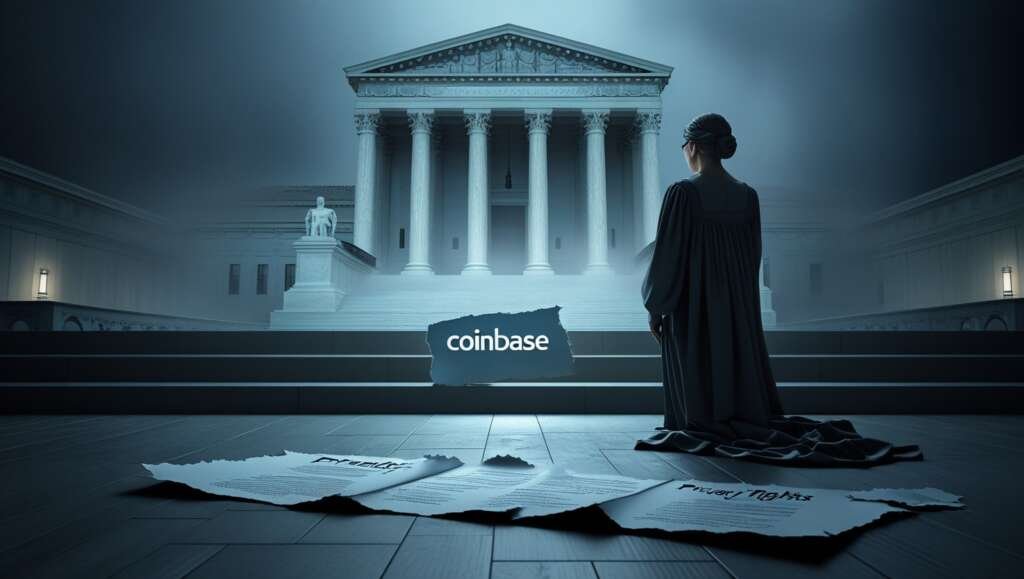The U.S. Supreme Court on Monday declined to hear Harper v. Faulkender, a case that could have reconsidered whether crypto exchanges should have privacy protection rights. For a long time, crypto heavyweights, such as Coinbase, have voiced their opposition to the government’s request for users’ data. However, the Supreme Court’s refusal to rehear the case cements the decades-old third-party doctrine.
While this is a victory for the government, the ruling is a setback for Coinbase and others seeking privacy protections for blockchain data. It has far-reaching consequences on crypto privacy and exchanges.
The U.S. Supreme Court Upholds Crypto Data Access, Despite the Harper v Faulkender Petition
The Harper v Faulkender case petitioned the court to re-examine the decade-old ruling that gave financial institutions the absolute right to withhold bank customers’ records. Plaintiff James Harper, a Coinbase user, challenged the IRS summons issued to Coinbase in 2016 to reveal over 14,000 of its customers’ financial data. The IRS believed Coinbase avoided paying taxes on crypto gains.
Harper argued that the summons violated his Fourth Amendment rights. Coinbase resisted granting this request as long as it could before it gave in. Lower courts sided with the monetary regulator, ruling that user data held by third-parties aren’t protected under the Fourth Amendment. This is in line with the 1976 Miller ruling.
The Supreme Court’s refusal to rehear the case means government agencies can continue to request customers’ data from centralized exchanges without a warrant. The justices didn’t offer any reason as to why they declined to rehear the case.
Hopes Dashed as Privacy Protection Rights Stall
Conservatives have long critiqued the third-party doctrine, claiming it infringes on user privacy. The Supreme Court made an exception to this rule when it ruled in a case involving phone carriers and customers. The ruling mandated that phone carriers must obtain a warrant to access customer data.
Crypto enthusiasts had hoped that the Harper case would follow a similar ruling. Earlier this year, Coinbase filed an amicus in support of Harper. The case would have determined whether Blockchain data qualifies as sensitive enough to be treated differently with regard to the third-party rule.
What the Ruling Means for Crypto and the IRS
Pseudonymity, which users have come to love about crypto, will be at risk, as the government can access and collect data, even without a probable cause. Government agencies have legitimate backing of the law to expose users’ financial histories and metadata, without a warrant. Users will be subjected to massive surveillance on centralized exchanges.
As for the IRS, it’s a complete victory. The ruling cements its enforcement power, building on its rule that requires crypto platforms to provide transaction costs through 1099 forms. Furthermore, the ruling reflects Donald Trump’s oversight. Although he promotes crypto infrastructure aggressively, he believes that regulations would help keep the ecosystem safer.
Trump previously defended the IRS’s ability to collect financial information from crypto exchanges to identify those who potentially failed to pay taxes. Before the ruling, the U.S.government urged the Supreme Court not to take up Harper’s challenge against the IRS’s efforts to obtain crypto transactions metadata.
What’s Next for Crypto Exchanges Amid Privacy Protection Rights?
Elon Musk and a few others mounted amicus briefs in the past, warning of banks’ and government agencies’ overreach. When laws like this favor the government, there tends to be a certain level of abuse, which Musk warns about. He previously told the United States Supreme Court to protect users from the government.
As privacy takes center stage, more privacy-centric wallets and decentralized IDs may explode. Lawmakers may also pursue legislative solutions that may give balanced digital privacy protection.




